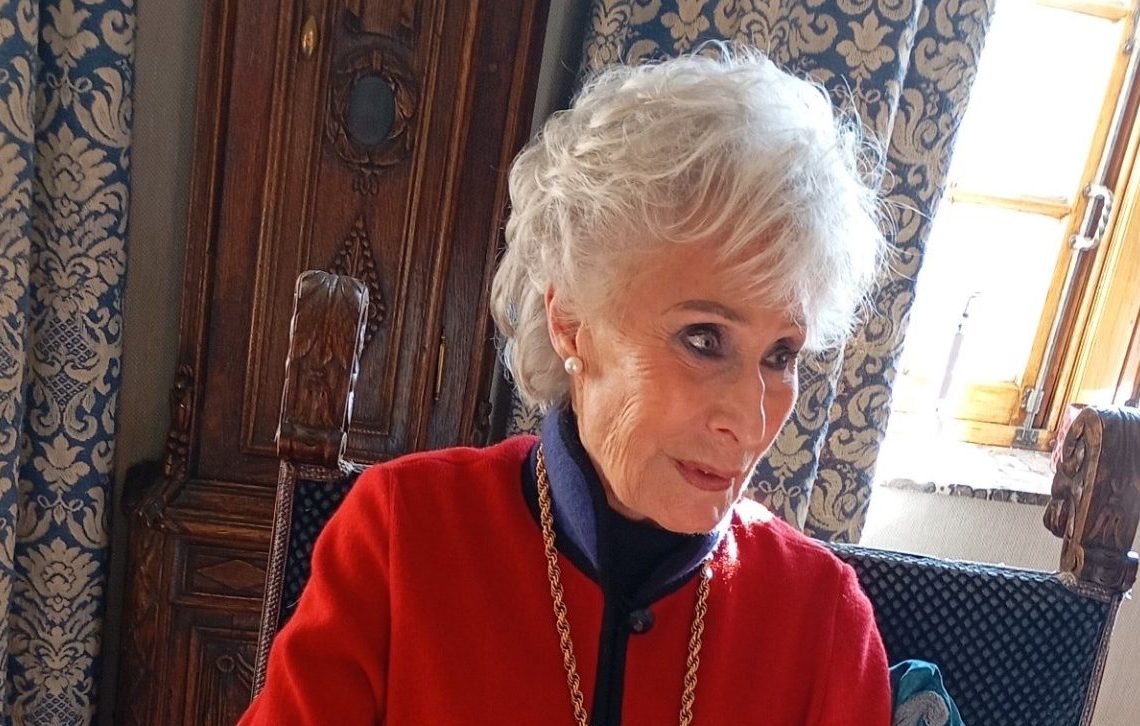I journeyed for an hour and a half from Brussels to Madame Joelle Goosens Bara’s residence, a hunting lodge nestled in the expansive countryside. I was eager to listen to some of her recollections of the splendid Hotel Astoria in Brussels.
Madame Joelle welcomed me on the porch with her daughter, Madame Diane. I noticed a prominent writing on the wall 377COY. HQ and queried it. “The Germans and later the British had taken over this place as their headquarters during the War. The whole area around us was quite heavily mined. We actually found a bomb some five years ago.”
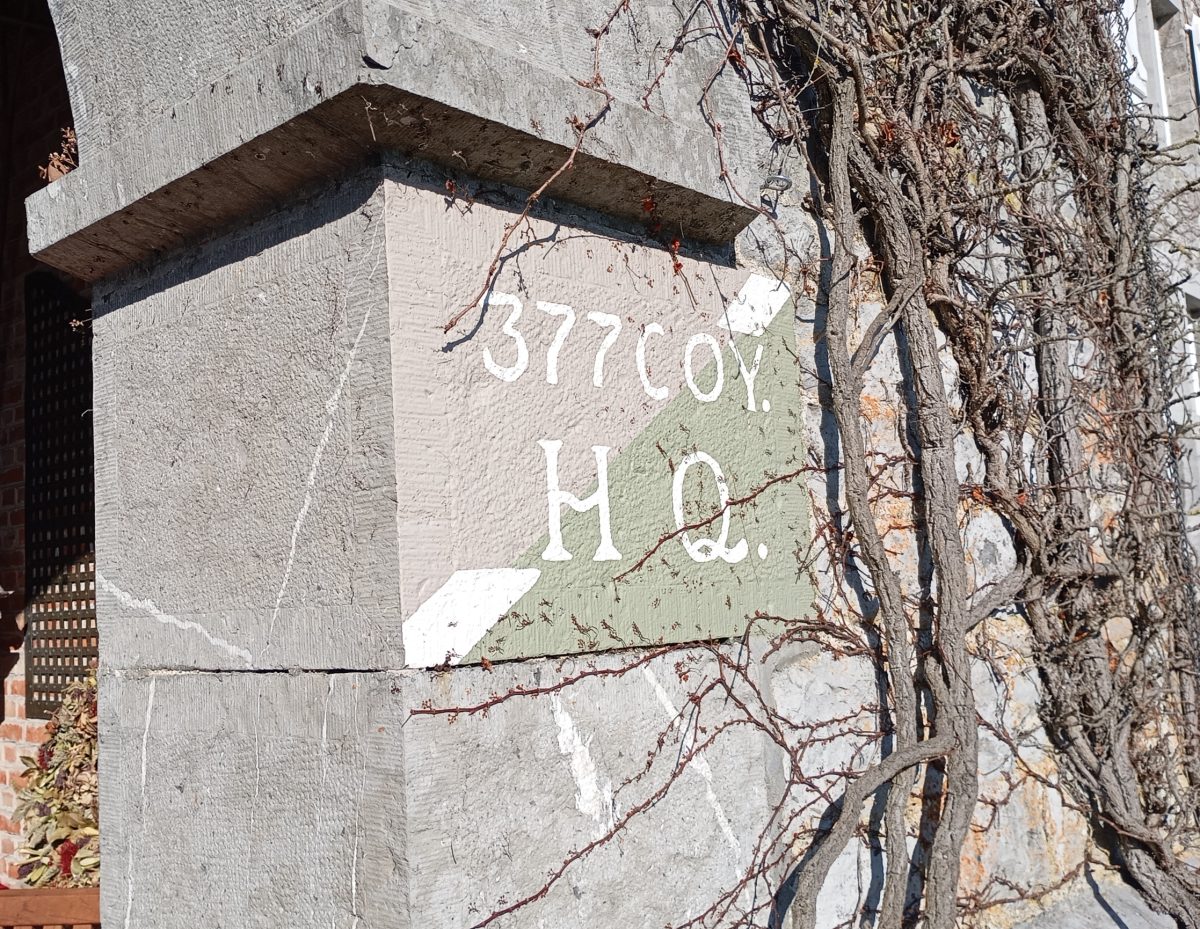
I jokingly asked Madame Joelle whether it was safe to enter. She laughed at the remark. Her grace and elegance did not diminish her homeliness and warmth as she led me inside. Her daughter casually ensured that I was comfortably accommodated and offered me a variety of drinks, which I declined in favour of a refreshing glass of still water.
The Corinthia Grand Hotel Astoria in Brussels has only recently opened its doors to the public. This architectural gem has been meticulously renovated and restored with great care, love, and passion, honouring its rich and illustrious past.
In 1907, Raphael Devillers, the grandfather of Madame Joelle Goossens Bara, who served as the Commander of the Guards at the Royal Palace, was likely stunned when King Leopold II of Belgium requested that he persuade his wife, Marthe Mengelle, to demolish their family hotel (Mengelle Hotel) and construct a lavish palace hotel for VIPs attending the 1910 International Exposition. Thirteen million visitors attended the Exposition within a span of six months.
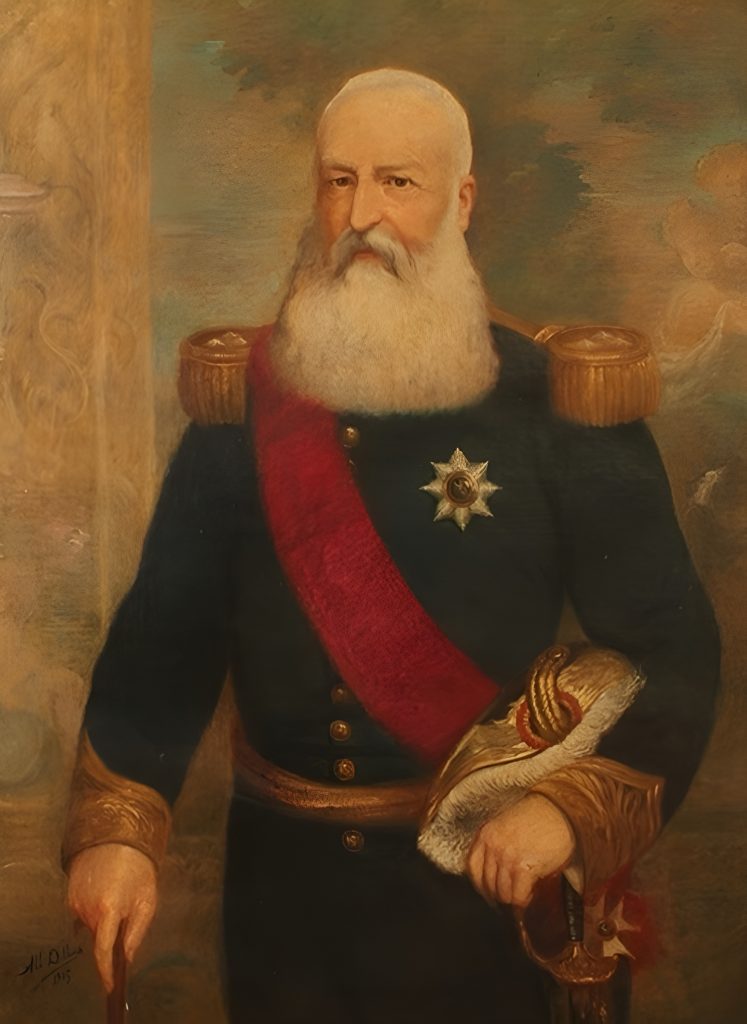
King Leopold II of Belgium
Did she recall any family whispering about that extraordinary royal request?“This happened well before I was even thought of. But the general family feeling has always been that grandfather did not really have any choice when faced with the King’s request. It was like a bomb!” exclaimed Madame Joelle, who deeply empathised with her grandfather. “He was ordered to visit the Hotel Adlon in Berlin and draw inspiration from it,” she added, bowing three times to mimic her grandfather’s likely response to the royal command.
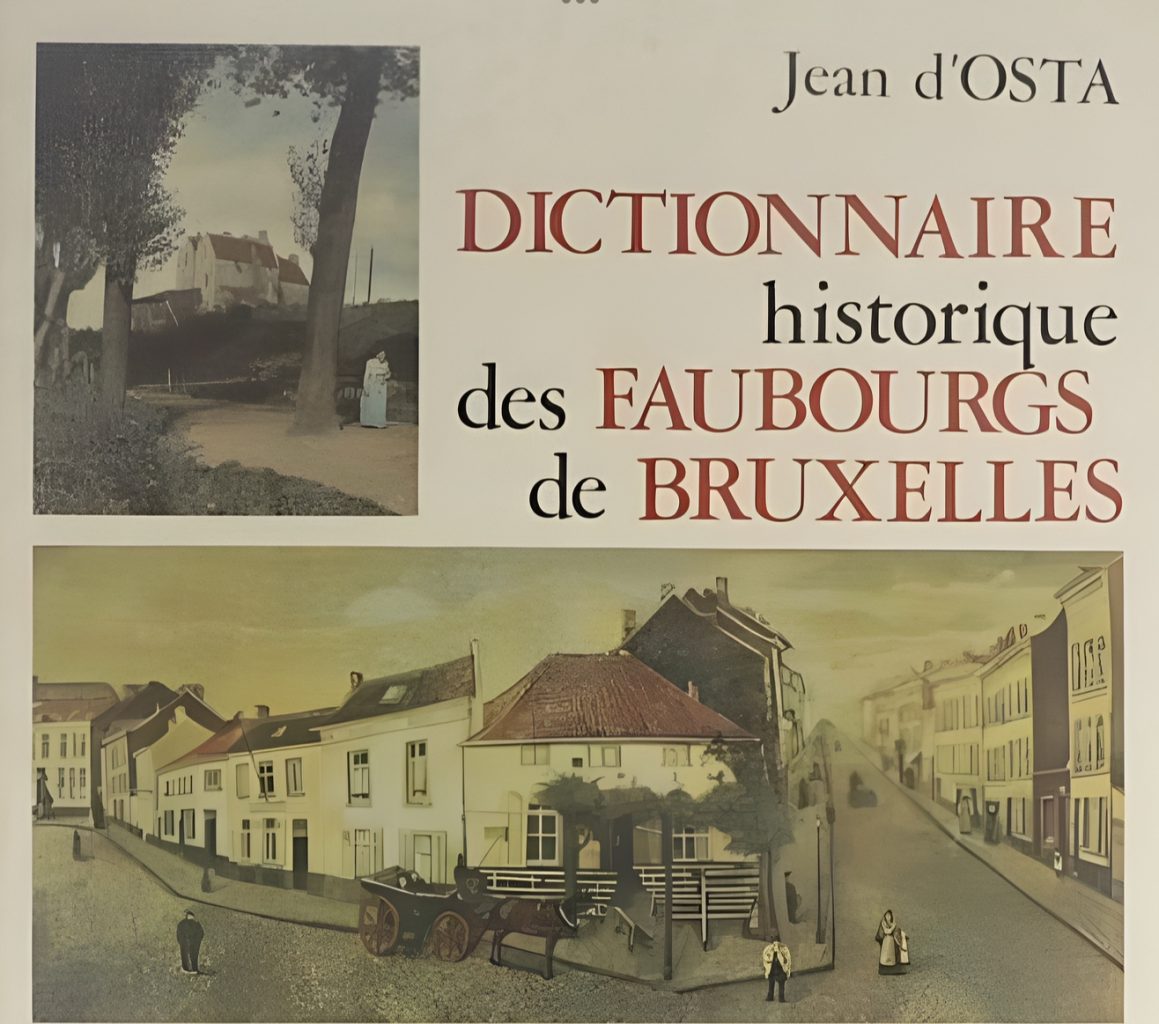
The book which suggested financial support in high places
Nonetheless, was there any financial backing from the royal family? In his 1986 book, Jean d’Osta remarked that the Mengelle family allegedly received “financial support in high places.” However, Madame Joelle noted cautiously, “I’m unaware of any financial aid from the king; the family never mentioned it, at least not in my presence. Nor is there any documentation to suggest that.”
The hotel was completed in time for the opening of the 1910 Brussels International Exposition. King Leopold had passed away shortly before the opening, and his successor, King Albert, welcomed the first wave of visitors.
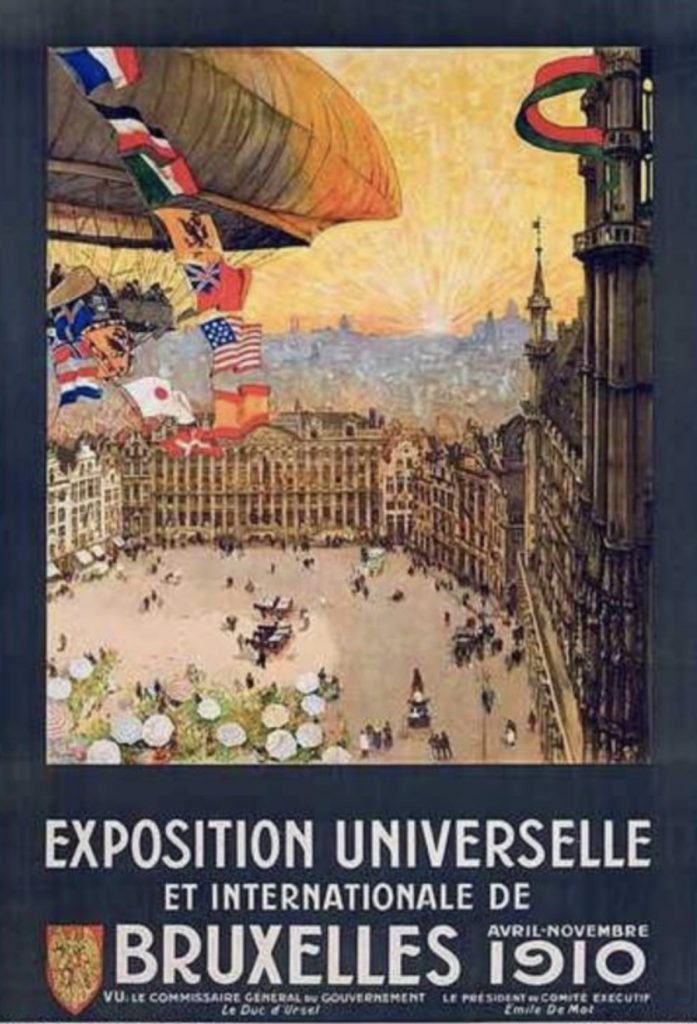
Although the historical context was fascinating, my main reason for meeting Madame Joelle was to listen to her personal stories. So I inquired about her earliest memory of the hotel. She chuckled softly and recounted, “I was very young—just a little mouse, as I like to say. We had lived in France during the war, so I was about four when I first visited the Astoria. I distinctly remember feeling overwhelmed by the grandeur of the building and its countless rooms. I sprinted around, looking for good hiding spots, trying my best to avoid being found. Upstairs, downstairs, everywhere. Hide-and-seek was the perfect game for such a vast place. My parents kept calling me to join them for dinner, but I switched my hideaway with every call. I don’t think they ever tracked me down.”
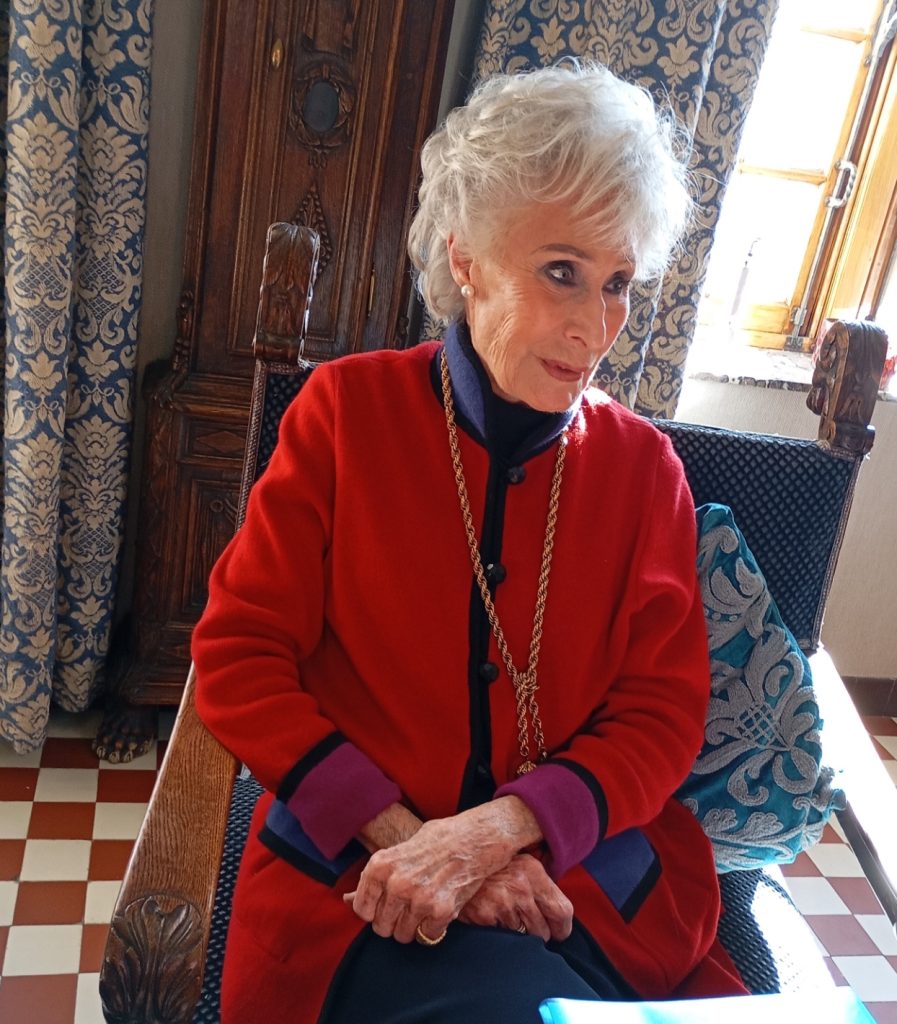
Madame Joelle Goossens Bara
Her face mirrored the excitement of that initial memory. As the 20th-century Italian writer Cesare Pavese perceptively observed, “We do not remember days; we remember moments.”
Certainly, there must have been a location in the hotel that remains vivid in her early memories. “One evening, my parents and family were hosting guests for dinner. The conversation was dull and didn’t engage me at all. I can still clearly remember sitting alone at a small table in the dining room by the open fireplace, feeling incredibly cosy next to the crackling flames. I was either writing or drawing, wrapped in a feeling of comfort and protection. I still hold onto that mental image.”
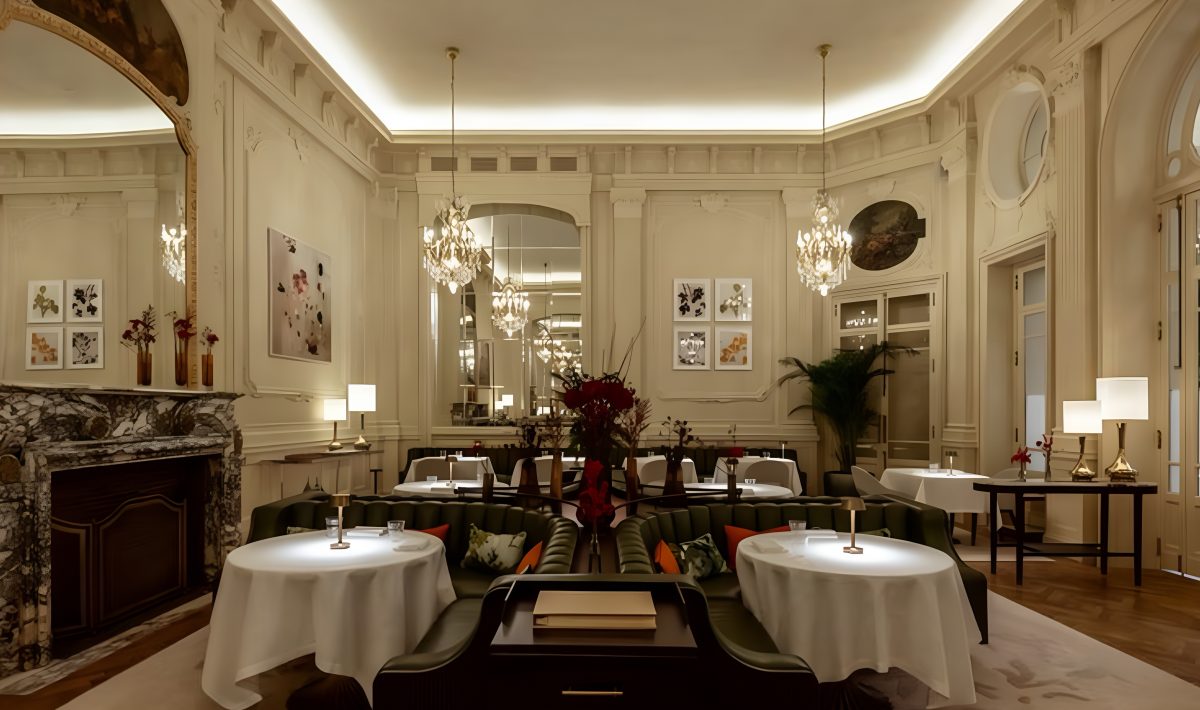
The Palais Royal Restaurant where the fireplace still exists (see left)
l inquired if the dining room she referred to was what is now the Palais Royal Restaurant, located next to the current Palm Court. “Exactly right! You’ve got it!” A wave of excitement coursed through me. I knew the exact spot; the day before, I had admired that fireplace, which, like Madame Joelle’s memories, has also endured the test of time and still embellishes the room.
My hostess had more recollections to share: “Another part of the Astoria that charmed me was the service quarters, which I found truly fascinating. I frequently visited that area and enjoyed watching the couturiers at work, others repairing furniture in the workshop, washerwomen, men hauling logs for the boilers, and ladies bustling about in the laundry rooms. The atmosphere was vibrant and filled with activity, creating a striking contrast to the serene calm of my room and the boring visits of the elderly.”
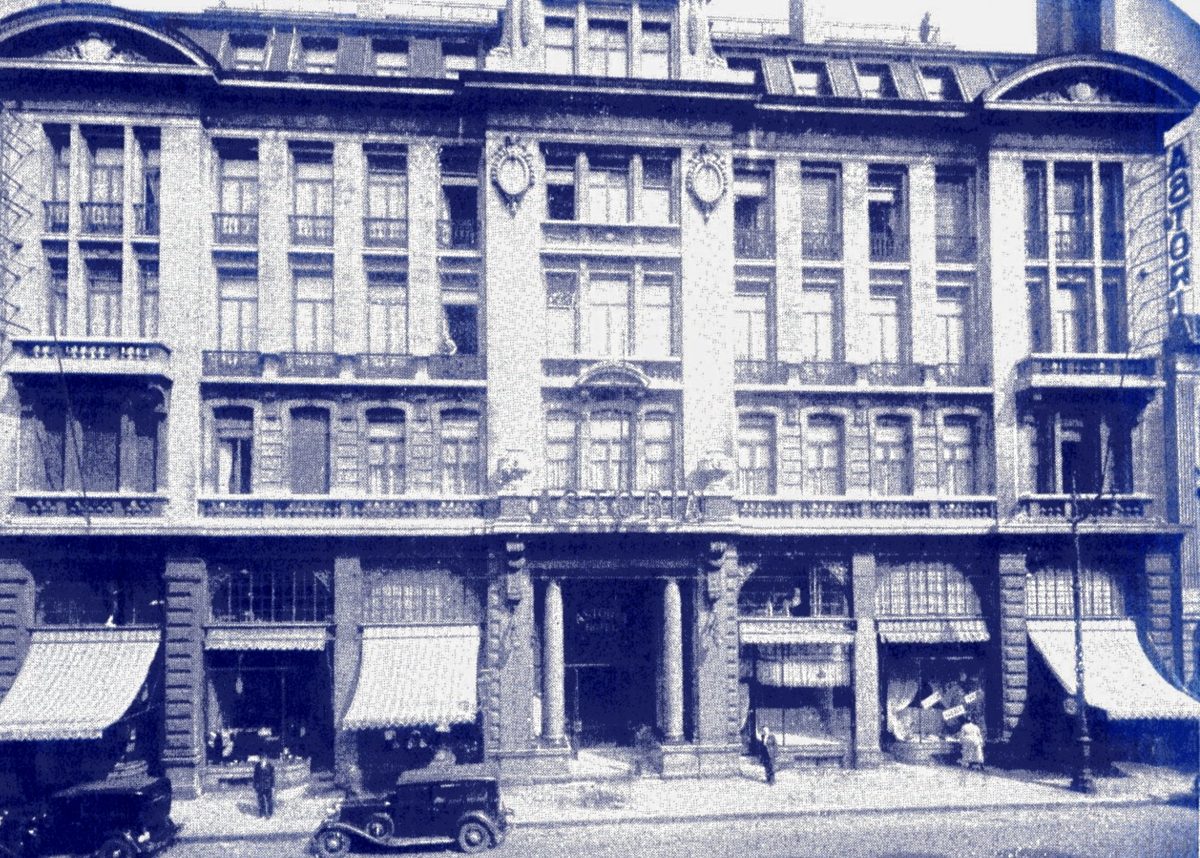
The hotel facade in its very early days
Madame Joelle suddenly seemed to remember an anecdote. With a smile, she remarked, “You have to hear this. It was soon after the war, likely in 1945, when Mr. Churchill visited Brussels. The thrill was unbelievable; everyone celebrated this extraordinary figure. I felt elated as well. I had spent hours preparing confetti, meticulously cutting small strips of colourful paper to shower on him as he walked by us.”
But was there really such widespread enthusiasm? Later, I decided to verify Madame’s recollection by consulting Martin Gilbert’s book ‘Churchill: A Life.’ There it was, clearly documented: “That November [1945], Churchill made a brief visit to Paris and Brussels. He was greeted everywhere by cheering, exuberant crowds. ‘I have never seen such excitement or enthusiasm,’ recalled the British Ambassador to Brussels.”
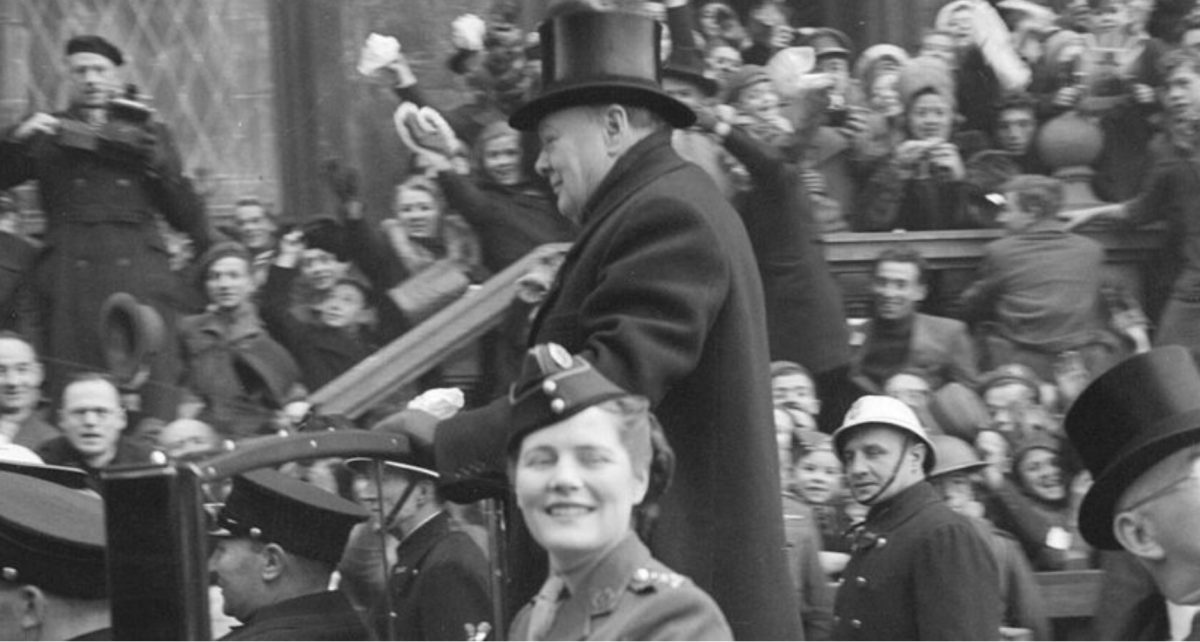
Winston Churchill warmly welcomed in Brussels. November 1945
The story goes on: “I had a basket full to the brim with confetti and positioned myself carefully on the facade balcony of the hotel to shower it down on Mr Churchill. I did just that, but suddenly, there was a gasp of shock. I realised I had left my scissors in the basket, and they fell to the ground just inches away from that British icon.”
I asked if there was any police reaction. “Thank God, it appeared immediately to be a child’s mistake, and the matter was taken lightly. Can you imagine if I did hit Mr Winston Churchill?”
The ever-helpful Giulia Galia from Corinthia Astoria assisted me in tracing the Signature Suite, known as the Royal Heritage Suite, on the first floor, from where the confetti—and the scissors—were thrown.
A striking feature that captures the attention of every visitor to The Corinthia Grand Hotel Astoria Brussels is the impressive 11-metre-high stained glass skylight.
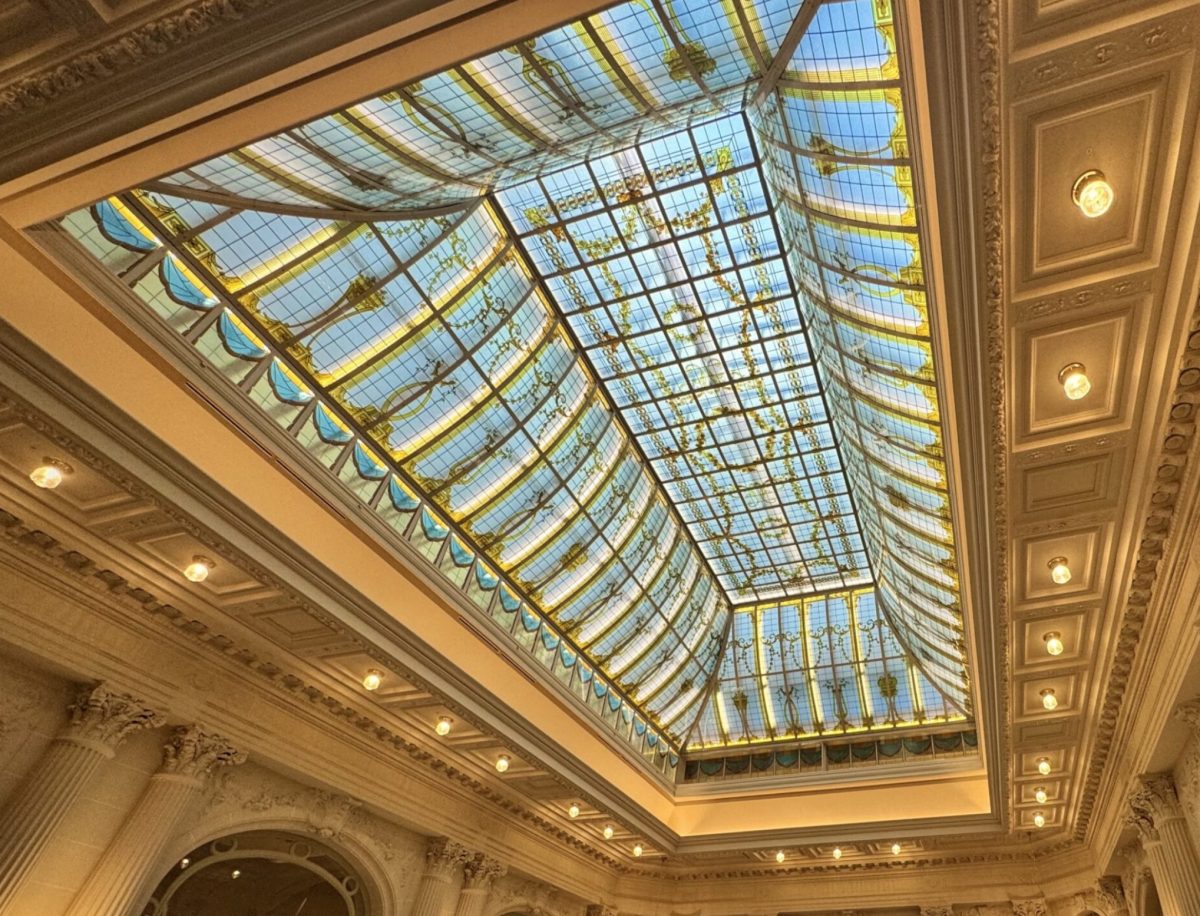
The breathtaking reconstructed skylight
Its reconstruction is indeed a remarkable technical achievement. Francis Metzger, the architect responsible for the hotel’s renovation and the restoration of adjacent buildings, noted that the team’s initial challenge was its design. They had to work with just three black-and-white photographs of the original roof and employed descriptive geometry based on those images to create a digital 3D model.
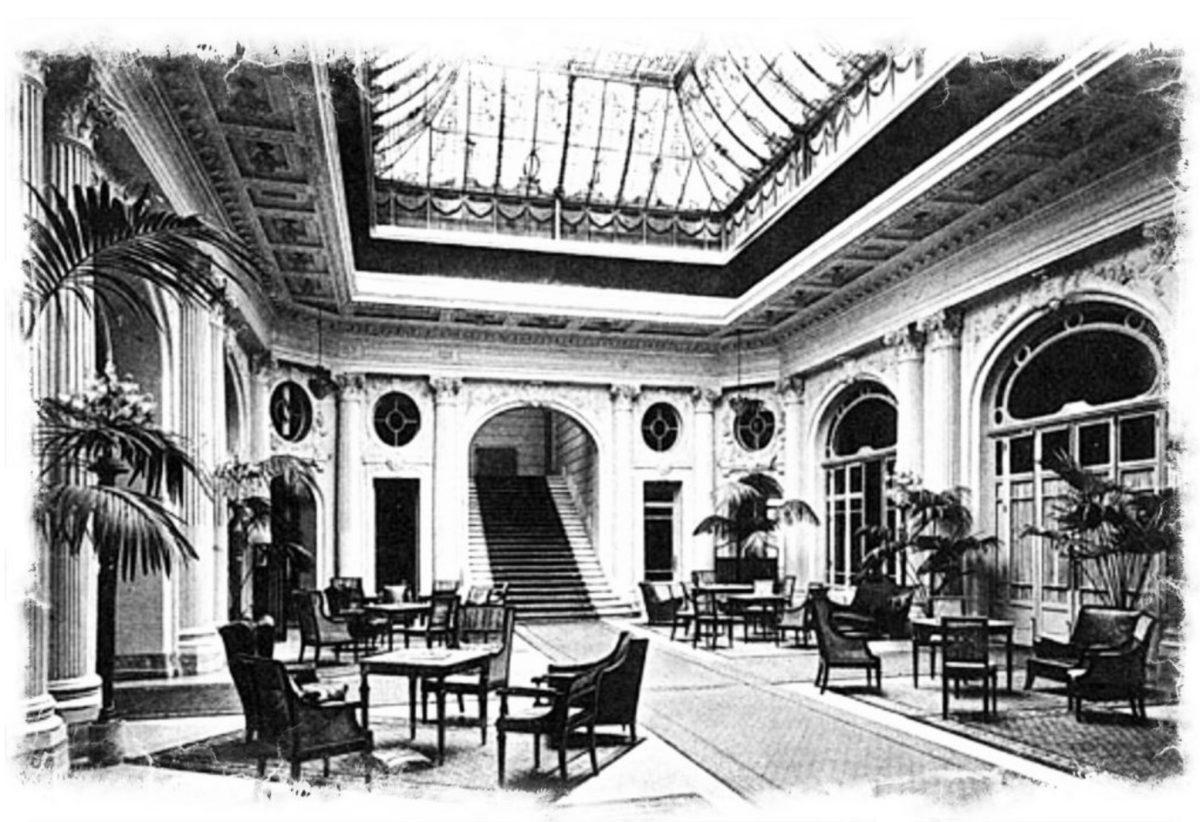
The original skylight
The original skylight must have been spectacular. Did Madame Joelle recall it? “No, I don’t,” she replied. “But I remember my grandmother having a small remnant of it. It had vibrant yellows and blues, but it must have been misplaced over time and I have no clue where it might be, if it still exists at all.”
“When I first visited the Astoria after returning from France post-war, the original skylight had already been replaced by a dull, clear, flat glass. It was leaking rainwater heavily at times, so I remember helpers strategically placing buckets to catch the drips. Quite embarrassing!
“It’s a shame that small remnant of the original skylight is lost… but you know what?” Madame Goossens Bara said with excitement in her eyes. “I still have the small ceremonial trowel used to lay the foundation stone of the hotel.”
I couldn’t contain my enthusiasm. Such artefacts carry immense significance in recreating an atmosphere and reviving memories. I could imagine it occupying a distinctive place in the Hotel.
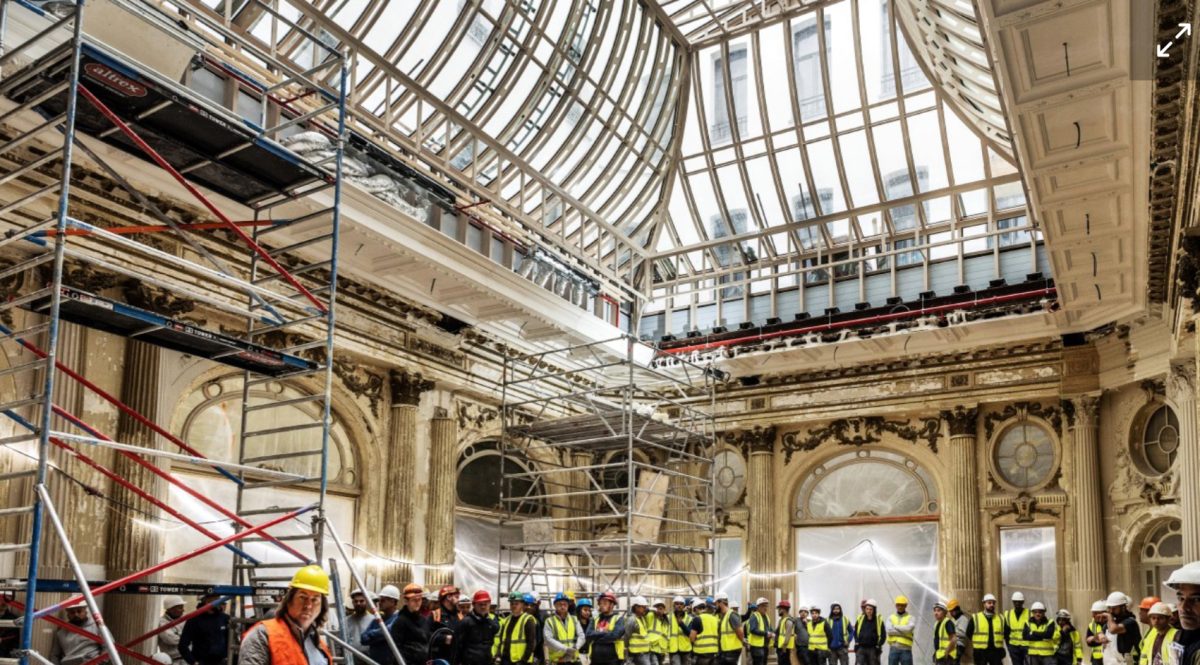
Mounting the enormous skylight. Such a tour de force!
The Hotel after the war must have been quite deserted.
“Indeed, when we arrived, there were no guests at all. Only a handful of people lived there for maintenance duties. My grandparents had entrusted the management to my grand-uncle, but we recognised the need for a professional approach to hospitality, as the industry was fast evolving. My parents frequently travelled to Switzerland, and during one visit to the Palais de Villars, my father concluded that we needed to engage a professional Swiss manager. The Astoria couldn’t continue as a family venture—like a family folly. So, he made some connections, marking our first experience with professional management. However, after the Swiss manager passed away, we faced significant challenges with the manager’s widow, who my ageing grandfather had somehow granted authority to manage the hotel after her husband’s death. But that’s a sad tale best left untold.“
I chose not to delve deeper.
“We didn’t pursue legal action because we were advised that it would turn into a lawyers’ windfall, and although we had a strong case, it would likely not be worth the effort in the long term. My beloved husband, Robert, a notary by profession, completely concurred with this painful yet wise decision.”
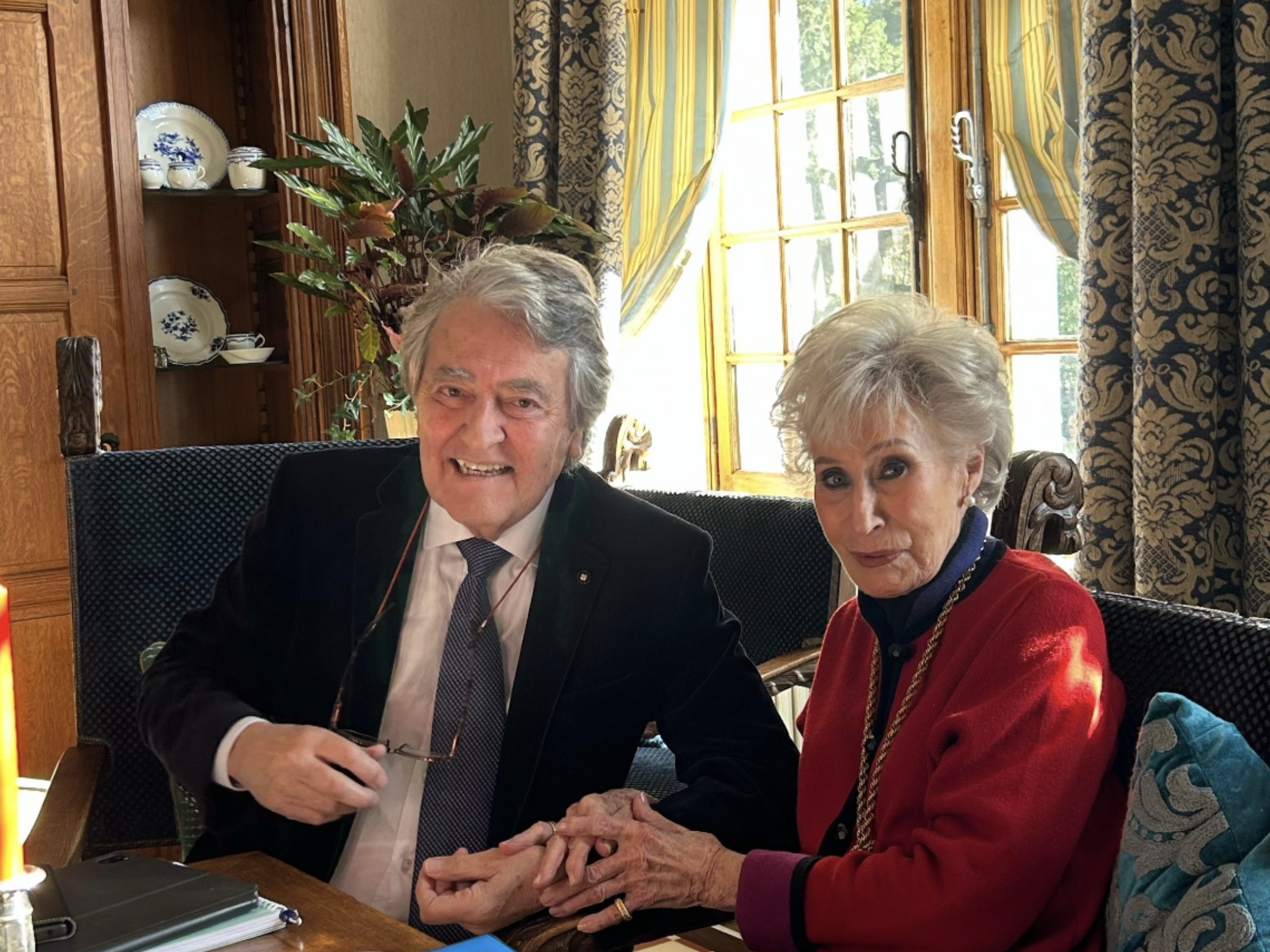
Madame Joelle with the author, Philip Farrugia Randon
I inquired whether Madame Joelle’s parents had made the Hotel their home. “No, they did not,” she replied with a slight smile tinged with nostalgia. “They both loved the Astoria very much, but their affection was more suited to visits and brief stays rather than making it their business hub. My father was a classic product of his era —work was not considered respectable. My mother was indeed a lovely woman, well-liked by all, but the intricacies of business negotiations and management were outside her domain. When they did stay at the hotel, they had a room on the fifth floor, a favourite spot of theirs, while my grandparents occupied the first floor, which, at that time, was regarded as the most prestigious area of the building.”
This anecdote aligned perfectly with a previous observation made by Architect Metzger, who had noted that from 1910 the hotel’s Royal Suite was prominently situated on the first floor of the main facade.
“My parents frequently travelled all over the world, and from the age of ten, I attended a boarding school in Villars, Switzerland. After their divorce, my mother settled in Lausanne. I stayed in Switzerland until I turned 17, although I often visited Brussels to see my grandparents at the Astoria.
“I was just 17 when I first met my beloved husband, Robert, at a party hosted by one of my cousins before her wedding. My parents were keen to see me become well acquainted with Brussels society. Later, Robert became the Notary for the Astoria, which he also loved immensely.”
Was it love at first sight with Robert? “It felt special from the start, and our love has persevered through the years.”
I then guided Madame Joelle along a more sombre part of the narrative. Was it difficult to bring things to a close and say goodbye to the Hotel?
She lowered her gaze to the table before her as if summoning the courage to speak. “Life resembles a book, with its various chapters. After our experiences with Wagons-Lits and Accor, who had separately taken up the management of the Hotel, we reached a point where we had to decide whether to invest very heavily in renovations or call it a day. Robert and I were advancing in age, but we needed to consider if our children would take on the responsibility. We held sincere and open discussions about this matter. My son is deeply involved in the music scene; hospitality is not his interest. My daughter, then newly married, also showed no inclination towards this challenge, leaving us with no viable option but the painful choice of closing the final chapter of our wonderful story. It was sad, very sad, like losing part of myself, my story, disconnecting from my parents and grandparents. I felt I was letting them all down.”
She gently clenched her fists, remaining perfectly still for seemingly endless moments. That silence said it all.
I sensed that disrupting that stillness was inappropriate, so I chose to wait for her to speak first.
In 2007, the property was acquired by Global Hotels and Resorts, owned by Saudi Arabian Sheikh Mohammed El-Kereji. Although restoration and renovation efforts began, they were ultimately halted, leaving the property vacant for several years.
The great 13th-century Persian poet Rumi wrote, “Goodbyes are only for those who love with their eyes. There is no such thing as separation for those who love with their heart and soul.” This sentiment surely resonated with Madame Joelle, who cherished the Astoria deeply in her heart despite no longer owning it.
Clearing her throat, she exclaimed, “It was painful seeng the property closed with no work progressing for a number of years. True, we were no longer owners but we did not stop loving it. Time passed very slowly. Then something unexpected happened; you won’t believe it! One day, my husband, Robert, and I travelled to Budapest and stumbled upon a charming hotel. We were both astonished and exclaimed, ‘This is exactly what we envision for the Astoria. This is it!’ We went inside and met the manager, discovering it was the Corinthia Budapest.
“We reached out and communicated with various contacts, ultimately leading to Corinthia’s acquisition in 2016.”
Hearing those words, I suddenly felt it was written somewhere in the ether that Corinthia and Hotel Astoria were predestined to meet one day.
Incredibly, Astoria’s Palm Court, with its magnificent skylight, has been adorned since its inception with columns crowned by Corinthian capitals. The name and logo of Corinthia were inspired by the Corinthian capitals that still embellish its initial iconic dining hall in Malta. ‘The Fates will find a way’ (Virgil, Aeneid).
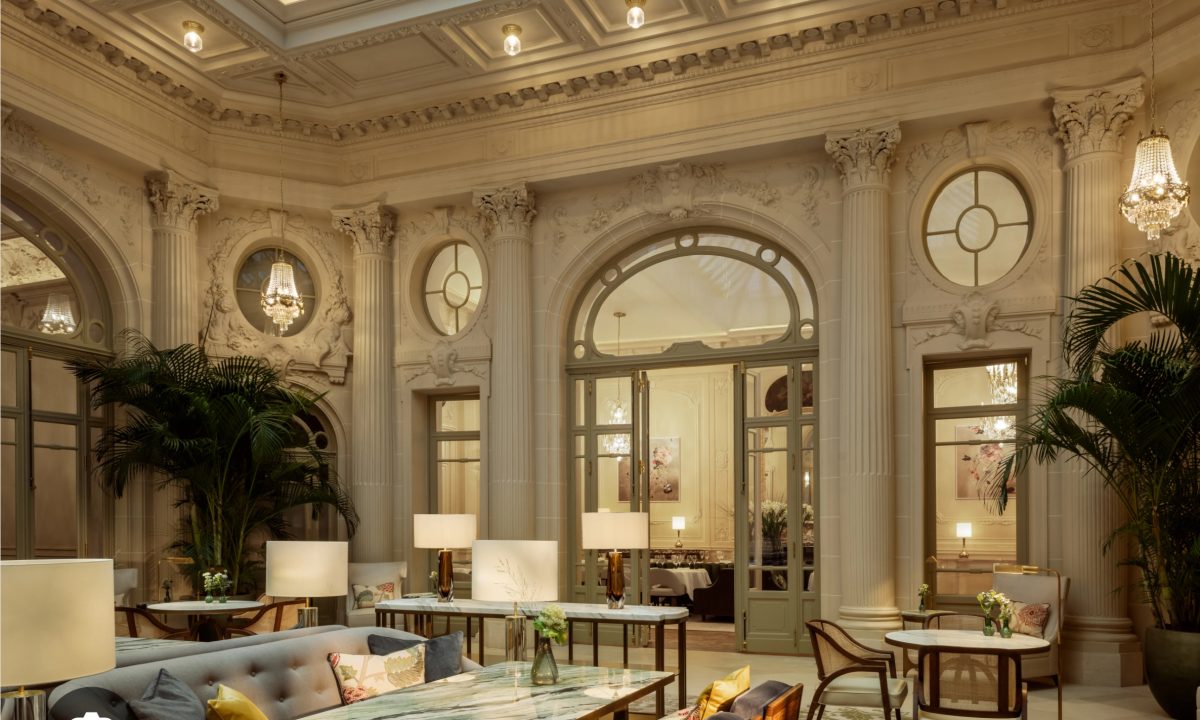
The Palm Court with its Corinthian capitals
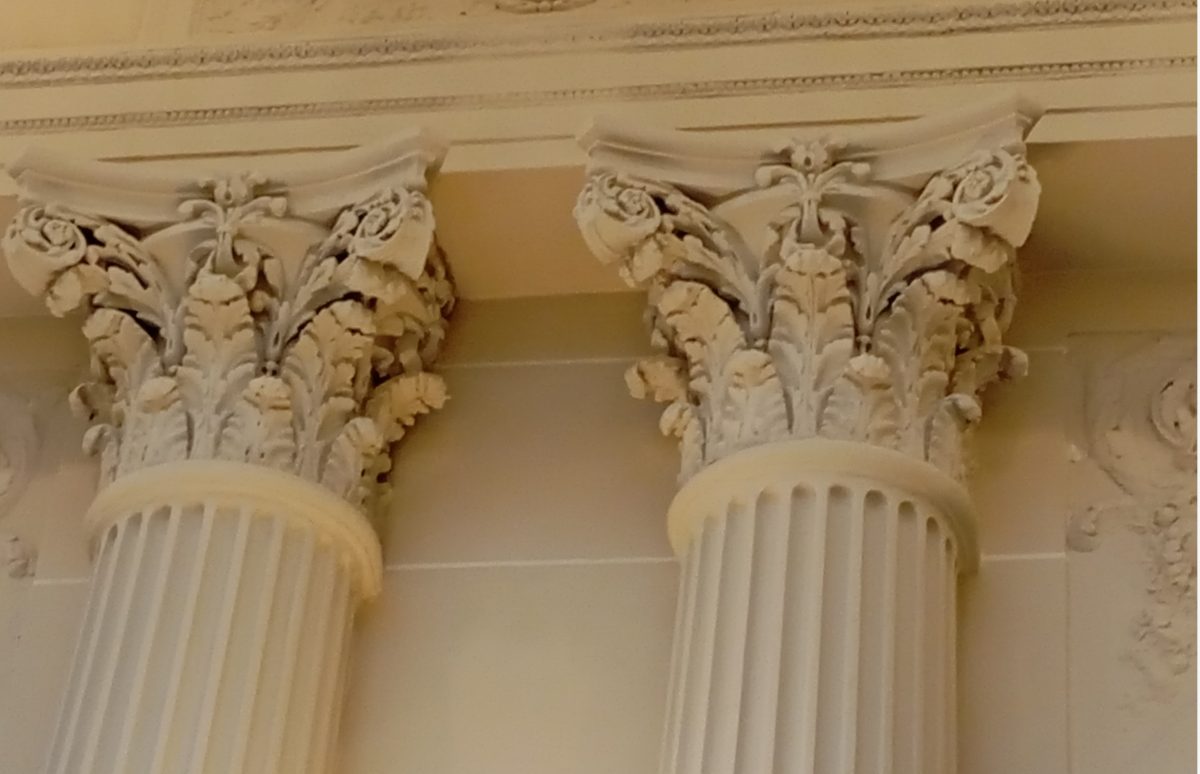
Corinthia Grand Hotel Astoria Brussels opened in December 2024, following an extensive and passionate multi-million restoration, reconstruction and refurbishment.
“Corinthia was initially a new name for us, but Robert and I felt an immediate connection with its spirit, especially after Alfred Pisani became our friend along with his wonderful wife, Maria.
“Each day, we received updates from friends and family about the visible progress. However, naturally, there was much work that they could not observe.”
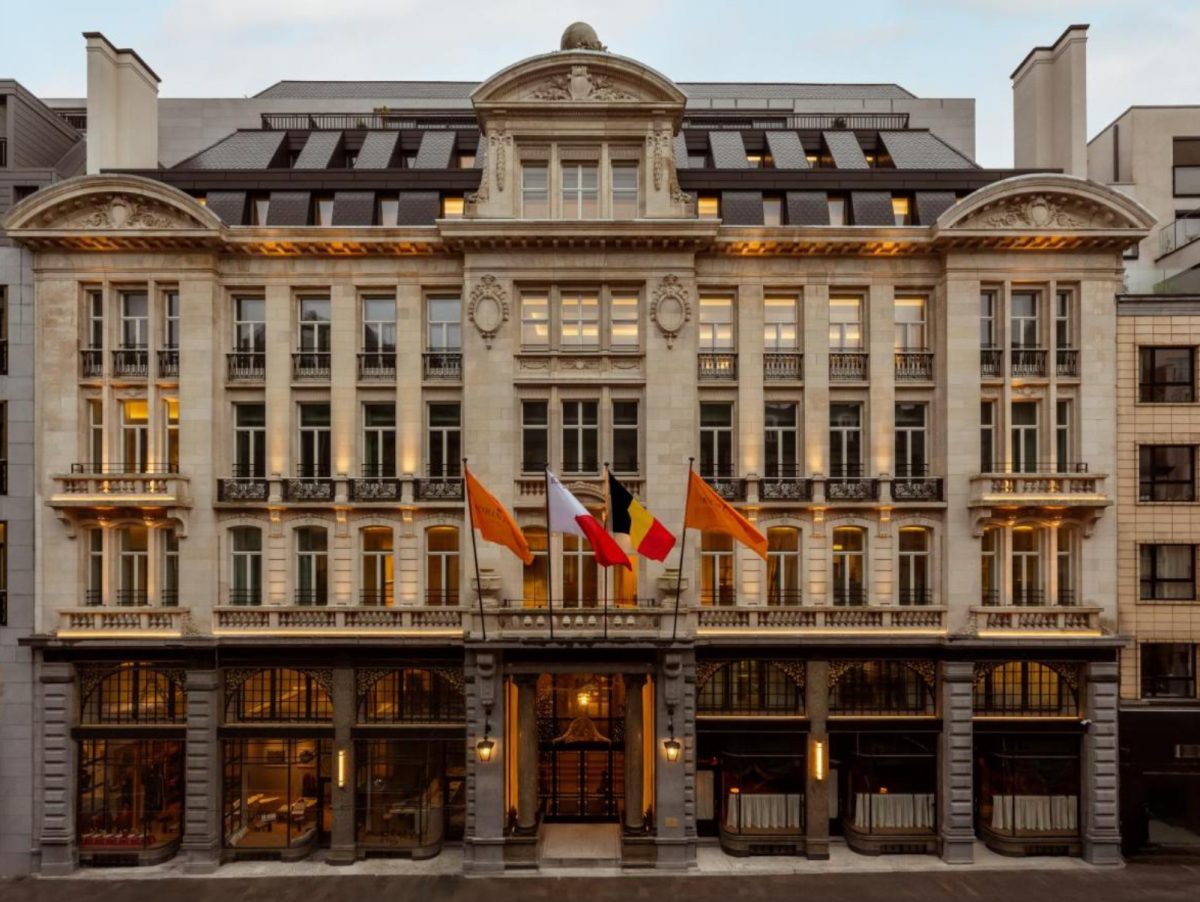
Corinthia Grand Hotel Astoria today, proudly flying a Maltese flag
Feeling it was time to conclude, I inquired about her first visit to the Corinthia Grand Hotel Astoria following its restoration. Indeed, she must have been very nervous on the day. What was her frank reaction when she saw the final result? Madame Goossens Bara crossed her arms and exclaimed, “Miraculous!”—reiterating the word three times.
This was an ideal way to wrap up an encounter full of nostalgia and recollections.

